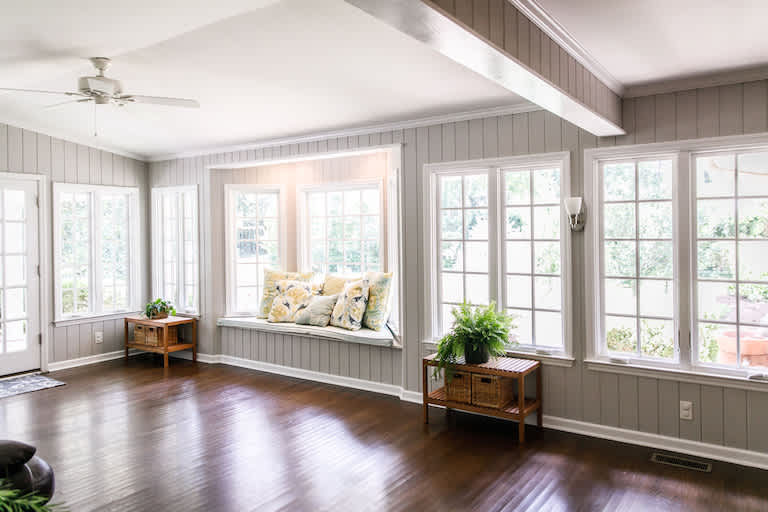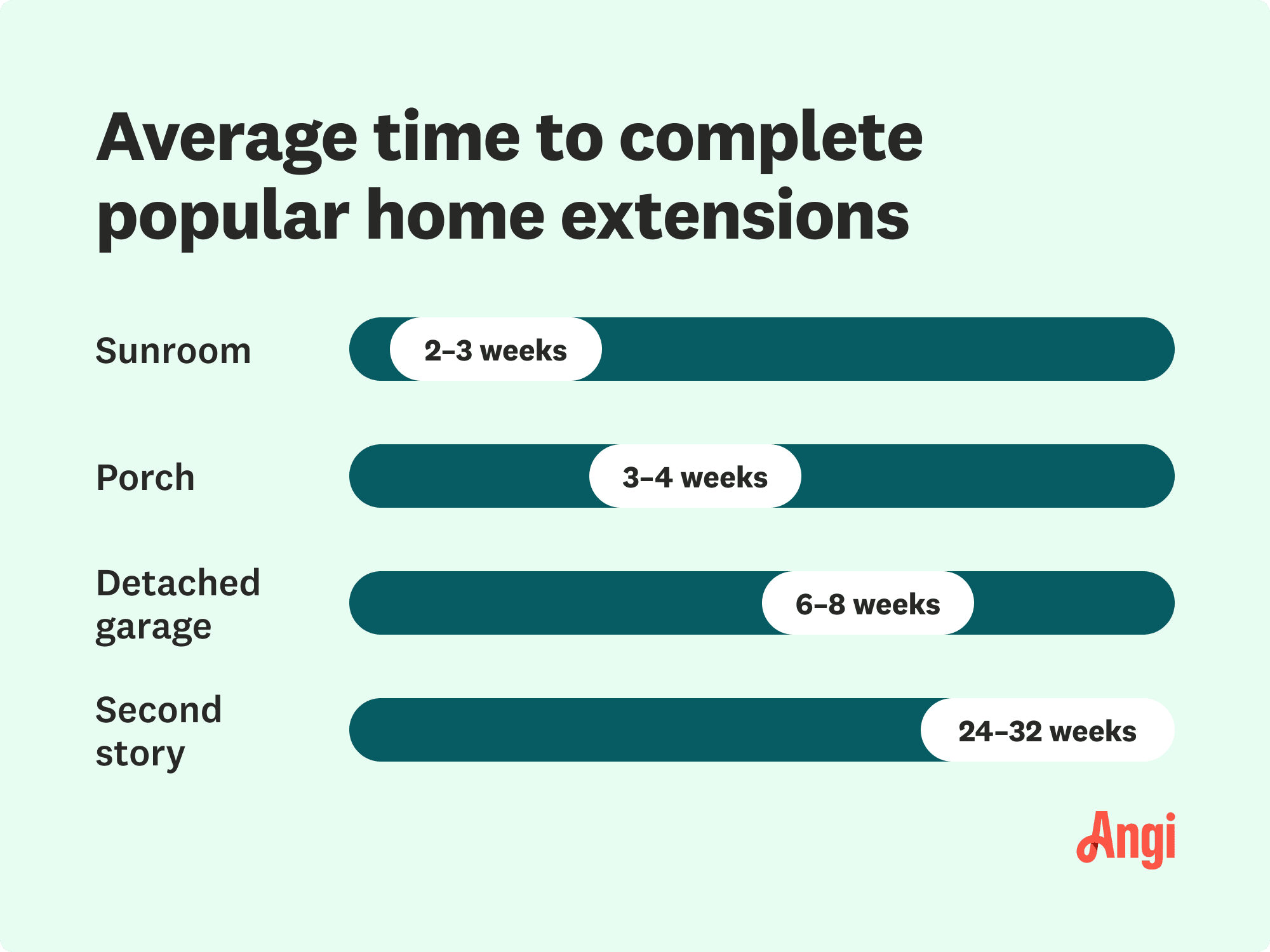
From budget-friendly builds to advanced plans fit for a gourmet chef, the price to build a kitchen can vary. Learn the average kitchen installation cost.
A home addition costs an average of $49,565 in Raleigh, North Carolina. Depending on the location, size, type, and materials, most homeowners spend between $24,694 and $74,437.


The two most influential cost factors are the size of the addition and whether you choose to add space above or beside your existing structure.
The average property size in Raleigh is 0.239 acres, so most homeowners have room to build out, which costs less than half what a second-story addition costs per square foot.
A home addition in Raleigh will increase your home value by an average of between 2% and 5.5%, making it a good investment overall.
Choose high-quality exterior materials like fiber cement siding and metal roofing that can stand up to excessive rainfall and keep your home cool in the hot summers.
The average cost to build a home addition in Raleigh is $49,565, and most homeowners report spending between $24,694 and $74,437. Your cost will depend mostly on the size and the type of home addition you’re looking to build. The above-average cost of living in the area contributes to higher labor costs, but large property sizes that accommodate build-outs help keep the average cost low.
A home addition in Raleigh, North Carolina, can cost anywhere from $12,000 to $120,000, and many factors determine where your total will fall within that range. You’ll need to consider the size of the addition you’re adding, the type of addition, the quality of the materials you choose, labor costs, site prep, and local permit costs.
Home additions cost between $80 and $200 per square foot if you’re building out and between $300 and $500 per square foot if you’re building up. The cost to add a 10x10 room to a house costs an average of about $13,500 if you build out and around $40,000 if you build up.
Where in those ranges your total falls also depends on the complexity of the room and its finishes. For example, adding a bathroom in a bumpout will cost more than a bedroom since it requires additional plumbing and electrical work.
Remember that if you add square footage to your home, the cost of your homeowners insurance will increase accordingly. Before you embark on this project, speak to your insurance company about expected costs.
The average lot size in Raleigh is roughly 0.239 acres, or around 10,400 square feet, and the average home is just under 2,000 square feet, with two stories and a 1,000-square-foot footprint. That means most homeowners will have plenty of room to build out or add to their homes.
This is one reason why the average cost of a home addition in Raleigh is below the national average, as homeowners in some cities have much smaller plots and are restricted to more expensive second-story additions.
| Size (Sq. Ft.) | Building Out | Building Up |
|---|---|---|
| 60 | $4,600–$11,600 | $17,400–$29,100 |
| 80 | $6,200–$15,500 | $23,200–$38,800 |
| 100 | $7,700–$19,400 | $29,100–$48,500 |
| 150 | $11,600–$29,100 | $43,600–$72,800 |
| 200 | $15,500–$38,800 | $58,200–$97,000 |
| 300 | $23,200–$58,200 | $87,300–$145,500 |
| 400 | $31,000–$77,600 | $116,400–$194,000 |
As you can imagine, it takes many kinds of building materials to complete a custom home addition. Material prices vary widely, so your price could push closer to $74,437 if you choose high-end materials at each step of the way.
Choosing luxury materials can push your total closer to $120,000, but this kind of investment may only be worthwhile in more costly neighborhoods where luxury is expected, like Oakwood, Cameron Village, or Downtown Raleigh.
The interior materials you choose will absolutely impact your costs, but they’re all up to personal preference. Exterior materials, on the other hand, need to withstand the extreme heat in the North Carolina summers, excessive rainfall, and the occasional tropical storm. The tables below provide a look at how different exterior materials suitable for Raleigh can affect your pricing.
Foundation Materials Cost:
| Foundation Material | Cost per Sq. Ft. | Pros | Cons |
|---|---|---|---|
| Crawl space | $6–$18 | Room for utilities | Expensive excavation |
| Slab | $5–$16 | Most affordable | No added space |
Insulation Materials Cost:
| Insulation Material | Cost per Sq. Ft. | Pros | Cons |
|---|---|---|---|
| Blown-in | $0.60–$2.30 | Keeps home cooler | Most expensive |
| Fiberglass batts | $0.30–$0.40 | DIY-friendly | Low R-value |
| Rigid foam | $0.25–$0.50 | Good R-value | Hard to install |
Roofing Materials Cost:
| Roofing Material | Cost per Sq. Ft. | Pros | Cons |
|---|---|---|---|
| Asphalt shingles | $1–$4 | Most affordable | Hotter in summer |
| Concrete/clay tile | $3–$13 | Insulates in summer | Structural concerns |
| Metal | $4–$16 | Reflects solar heat | More expensive |
Siding Materials Cost:
| Siding Material | Cost per Sq. Ft. | Pros | Cons |
|---|---|---|---|
| Brick | $10–$20 | Beautiful appearance | Expensive |
| Fiber cement | $5–$14 | Can add insulation | Sustainability |
| Stone | $7–$30 | Nicest look | Most expensive |
| Vinyl | $3–$12 | Most affordable | Minimal insulation |
Window Frame Materials Cost:
| Window Frame Material | Cost | Pros | Cons |
|---|---|---|---|
| Aluminum | $75–$400 each | Most affordable | Poor insulation |
| Composite | $300–$1,200 each | Good insulation | Expensive |
| Fiberglass | $500–$1,500 each | Best for comfort | Most expensive |
| Vinyl | $100–$900 each | Best value | Can warp in heat |
| Wood | $150–$1,300 each | Traditional look | Rot and expansion |

The cost to add on a room varies based on the type of home addition and the size of the room you’re building. Rooms like kitchens and bathrooms require plumbing work that a bedroom doesn’t, while an unfinished attic home addition may not require electrical or HVAC work that a bedroom needs. The cost per square foot for your home addition will vary based on utilities and the finishes required for how you plan on using the extra square footage.
| Addition Type | Average Cost |
|---|---|
| Bumpout | $9,700–$41,700 |
| Detached garage | $18,600–$32,600 |
| Dormer | $5,800–$24,300 |
| In-law suite | $24,300–$257,100 |
| Second-story | $97,000–$242,500 |
| Sunroom | $21,300–$72,800 |
On average, site prep for a home addition costs between $1,500 and $5,000. You may not need any site prep in some cases, while other home addition projects may require grading land, demolishing concrete patios, removing trees, and other work that can add to your total.
In an area like Raleigh, where most homeowners have plenty of room on their properties to build out and save money instead of a second-story addition, you’re more likely to have to budget for site prep. Clearing and leveling land will drive up these costs. However, since most homes in Raleigh don’t have basements, you’re unlikely to have to excavate for a build-out, which will help keep costs low.
The City of Raleigh requires building permits for home additions, so whether you’re building up or out, you’ll need to ensure you get the proper permits and pay the associated fees. The city determines fees based on many factors, so you should use the Raleigh building permit fee calculator or ask your home addition contractor what the fee will be.
For example, a 250-square-foot home addition in Raleigh will incur building permit fees totaling $647 in Raleigh, which includes a $96 plan review fee and individual permits for construction, plumbing, electrical work, and changes to your heating and AC system.
When you hire a home addition contractor or a homebuilder in Raleigh to build your home addition, you can expect between 40% and 60% of your total to go toward labor. That means labor costs alone will run you between $19,800 and $29,800. Labor is close to 10% more expensive in Raleigh than in most other cities due to the above-average cost of living in the area.
Your pro will also need to charge you sales tax, which will add to your total. The sales tax rate in Raleigh is 7.25%, and with the average cost of a home addition in the city, taxes will add an average of $3,593.46 to your total.
Yes, a home addition will increase your home value, as the project provides an average return on investment (ROI) of between 20% and 50%. In Raleigh, where the average cost of a home addition is $49,565, that means a return of $9,900 and $24,800. Given the average cost of homes in Raleigh, a home addition will boost your overall property value by between 2% and 5.5%.
Home is the most important place on earth, which is why Angi has helped more than 150 million homeowners transform their houses into homes they adore. To help homeowners with their next project, Angi provides readers with the most accurate cost data and upholds strict editorial standards. We survey real Angi customers about their project costs to develop the pricing data you see, so you can make the best decisions for you and your home. We pair this data with research from reputable sources, including the U.S. Bureau of Labor Statistics, academic journals, market studies, and interviews with industry experts—all to ensure our prices reflect real-world projects.
Want to help us improve our cost data? Send us a recent project quote to [email protected]. Quotes and personal information will not be shared publicly.
From average costs to expert advice, get all the answers you need to get your job done.

From budget-friendly builds to advanced plans fit for a gourmet chef, the price to build a kitchen can vary. Learn the average kitchen installation cost.

Remodeling your bathroom can add significant value to your home. Your bathroom remodel cost in Columbus, OH will depend on size, fixtures, materials, labor, and other factors.

Forget the spa. Steam showers bring the luxury right into your home. This guide will help you budget steam shower costs—no matter the specs.

From increasing resale value to being tricky to maintain, there are plenty of pros and cons of copper kitchen sinks. Figure out if they’re right for you.

DIY sink installation is a doozy but do-able for those with experience. Use this guide to learn how to install a bathroom sink in a few steps.

Learning how to remodel a house on a budget involves prioritizing projects and figuring out how much of the work you can do yourself to save on labor costs.